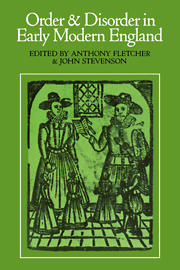Book contents
- Frontmatter
- Contents
- Notes on Contributors
- List of Abbreviations
- Preface
- Acknowledgements
- Introduction
- 1 Puritanism and Social Control?
- 2 Popular Religion and the Pilgrimage of Grace
- 3 Honour, Reputation and Local Officeholding in Elizabethan and Stuart England
- 4 The Taming of the Scold: the Enforcement of Patriarchal Authority in Early Modern England
- 5 Order and Disorder in the English Revolution
- 6 Drainers and Fenmen: the Problem of Popular Political Consciousness in the Seventeenth Century
- 7 Gender, Family and the Social Order, 1560–1725
- 8 The ‘Moral Economy’ of the English Crowd: Myth and Reality
- Index
- Index of places
1 - Puritanism and Social Control?
Published online by Cambridge University Press: 09 October 2009
- Frontmatter
- Contents
- Notes on Contributors
- List of Abbreviations
- Preface
- Acknowledgements
- Introduction
- 1 Puritanism and Social Control?
- 2 Popular Religion and the Pilgrimage of Grace
- 3 Honour, Reputation and Local Officeholding in Elizabethan and Stuart England
- 4 The Taming of the Scold: the Enforcement of Patriarchal Authority in Early Modern England
- 5 Order and Disorder in the English Revolution
- 6 Drainers and Fenmen: the Problem of Popular Political Consciousness in the Seventeenth Century
- 7 Gender, Family and the Social Order, 1560–1725
- 8 The ‘Moral Economy’ of the English Crowd: Myth and Reality
- Index
- Index of places
Summary
One of the current received suppositions appears to be, put very crudely, that from the 1580s the group of more prosperous men who had always provided the officials to run village society, now labelled ‘Village puritan elites’, were imposing a stricter moral code of behaviour, particularly on the poorer villagers. It is sometimes implied that this imposition was new. This tightening-up is reflected in the escalating number of cases of fornication, adultery, incontinence and, above all, illegitimacy, presented in the ecclesiastical courts. This essay is intended to examine this supposition and the assumptions about religious belief on which it rests for the late sixteenth and early seventeenth centuries and to compare this early modern period with the late thirteenth and early fourteenth centuries, which was in some ways demographically similar. The comparison should show whether the imposition of a stricter moral code of behaviour was indeed ‘new’.
The main evidence for the escalating number of moral cases presented in the courts has been given by Keith Wrightson, who shows that nearly one-third of the cases of bastardy presented between 1570–1699 for Terling in Essex were brought between 1597 and 1607, and another notable group between 1613 and 1616. He calls this dramatic upswing ‘an astonishing and, until recently, unsuspected aspect of the history of the period’. Bastardy was very much an offence of the poor and obscure and even bridal pregnancy was increasingly presented for the poor.
- Type
- Chapter
- Information
- Order and Disorder in Early Modern England , pp. 41 - 57Publisher: Cambridge University PressPrint publication year: 1985
- 24
- Cited by



